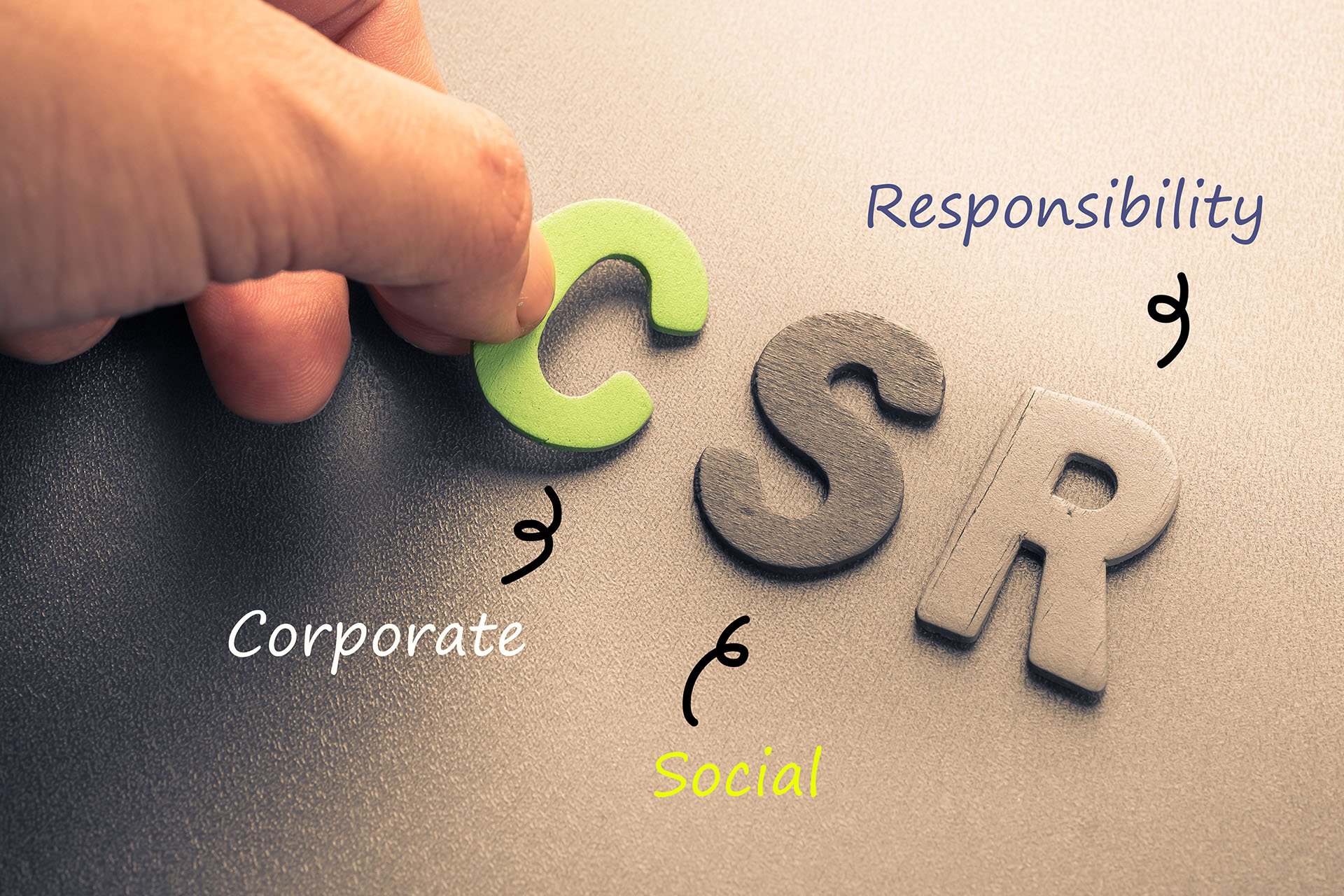Corporate social responsibility
Business is an economic activity; it is carried out to earn profits. But business organisations are involved in different actions which may not be part of their primary business objectives. Corporate social responsibility is the firm’s obligation to take decisions and make actions that will contribute to the welfare of the society and interests of the organisation. The decisions which are taken beyond the economic interest of the organisation are known as social responsibility. Businessmen spend money on various non-profit aspects such as transport, education, healthcare, developing gardens and parks for the wellness of employees and their families. In some places organisations provide free medical facility to the poor patients, adopting villages, and sponsor games and sports at national and international level. Organisations take inputs from the society and produce products or services which are again delivered to the customers who are the part of the society. So the organisations need to be careful in protecting the natural resources and interests of the society. Thus while taking decisions; managers need to think beyond the organisational view to protecting the social interests.

Several organisations spend a huge amount of money on societal development and for environmental protection. Social responsibility is a voluntary effort on the part of the business to take various steps to satisfy the expectations of the different interest groups. Some organisations are socially responsible by considering the following points.
Public image
The organisations perform activities towards the welfare of the society to earn goodwill and reputation for the business. The earnings of the business also depend on the public image of its activities which in turn attract the competent employees. Some customers prefer to buy products of a company that engages itself in various social welfare activities.
Government regulation
If an organisation pollutes the environment it shows the effect on the society. So the government imposes rules and regulations to avoid the pollution created by the factories. Organisations are taking the initiative to reduce the pollution by developing parks and other methods.
Survival and growth
Every business is a part of the society. So for its survival and growth, support from the society is very much essential. Business utilizes the resources like water, land, roads, and power, etc. so it should be the responsibility of every business organisation to spend a part of its profit for the welfare of the society.
Employee satisfaction
Besides working in a healthy atmosphere and getting a good salary, employees also expect other facilities like transportation, education, accommodation, hospitals and training. The employers should try to fulfill the needs of the employees because employee satisfaction leads to more productivity and helps in the maximization of revenues. If a business spends time and money on training the employees then it will help in acquiring the competitive advantage.
Consumer Awareness
Nowadays consumers are much aware of the products and services. They can fight against the harmful products. This has made it mandatory for the firms to protect the interest of the customers by producing quality products at the competitive prices.
Corporate social Responsibility towards different interest groups
The business organisations generally interact with various interest groups such as the owners, investors, employees, suppliers, competitors, customers, government, and society. In each and every business activity these interest groups are affected directly or indirectly and they are also called as stakeholders. Sometimes the responsibility towards the stakeholders is also called as Stakeholder’s Corporate Social Responsibility.

Corporate social Responsibility towards Owners
Owners are the persons who own the business and they are responsible for the profit or losses and they contribute the capital and bear the risks. The primary responsibility of the business towards its owners is to,
Should run the business efficiently
Proper utilization of capital and resources
Timely repayment of on capital invested
Corporate social responsibility towards Investors
Investors provide the capital by way of investment, it is in the form of debentures, deposits and bonds etc. without investors companies may not be run successfully. The investors included in this category are banks, public and financial institutions. The responsibilities of the business towards its investors are,
Providing assurance to their investment
Paying interests timely to the investors
Giving important updates to the investors
Repayment of principle amount timely
Corporate social responsibility towards Employees
Business needs workers or employees to work for the organisation they put their efforts for the growth of the firm. It is the basic responsibility of the organisation to take care of the interest of the employees and to fulfill their needs. Employee satisfaction leads to the achievement of the organisational goals. The responsibilities of the organisation towards its employees or workers include, wages and salaries should be paid timely and regularly
Providing proper welfare amenities and working conditions
Providing better opportunities for the career prospects
Providing Job security and social security
Providing facilities like pension, provident fund, retirement benefits, and group insurance, etc
Providing housing, canteen, transport, and creches etc
Identifying and fulfilling training and developmental needs
Corporate social responsibility towards Suppliers
Suppliers are the persons who supply semi finished goods, finished goods, raw materials and other items required by the firms. Market demand conditions can only be fulfilled on the basis of the supply of the raw materials. So the suppliers are the part of the success of the business. Managers should always notice the importance of the suppliers. Certain suppliers are called as distributors because they supply finished products to the consumers. The responsibilities of business towards these suppliers are,
Giving regular orders to purchase goods
Dealing with fair terms and conditions
Maintaining reasonable credit period
Dues should be paid timely
Corporate social responsibilities towards Customers
Business can only be survived with the support of customers. The success of the business completely depends on the customer satisfaction and customer loyalty. Brand image comes from these two factors, so being responsible towards the customers not only benefits the customers but it maximizes the revenues and makes possible to get the market empire. The responsibility of business towards customers is,
Products and services must fulfill the needs of the customers
Qualitative Products and services must be delivered
Regularity in supply of goods and services must be maintained
Prices of the goods and services should be fixed reasonable and affordable
Procedure, advantages and disadvantages of the product and the use of the products must be informed to the customers
Organisations must provide after sales service
Grievances of the customers must be settled quickly
Fewer quality services, under weighing the product and adulteration must be avoided
Corporate social responsibility towards Competitors
Competitors always help the business in becoming more innovative and dynamic. But it is not that much easy to face a severe competition. Firms always try to overcome the competition by giving discounts, by using various advertisement strategies, and so on. To become better than their competitor’s firms sometimes may follow unfair practices like giving sales commissions to the agents, heavy discounts to the customers, false advertisements, bribing the competitor’s employees to know the business secrets etc. The responsibilities of business towards its competitors are,
Not to offer high sales commission to distributors and agents
Not to offer heavy discounts to the customers
False advertisements should not be given to defame the competitors
Should not bribe the competitor’s employees to copy their products and services
Corporate social responsibility towards Government
Firms should follow the rules framed by the government. These guidelines are for the safety measures and for the benefit of the society. Responsibilities of the firms towards government are,
Following the guidelines are given by the government
Fees, duties and taxes should be paid regularly and honestly
Should not follow the restrictive trade practices
Firms should follow the pollution control norms
Should not follow the corruption and other unlawful activities
Corporate social responsibility towards Society
In almost all activities individuals, groups, organisations and families, etc interact with each other and dependent on each other. A relationship exists between them which may be direct or indirect. The increase in per capital income increases the value of the money and national income. With the increase in national income revenues of the business also increases. Thus it has certain responsibilities towards the society which may be as follows,
Firms should help the weaker sections of the society
Organisations should protect the social and cultural values
Firms should generate the employment by extending their business
Should protect the environment by taking proper measures
Natural resources and wildlife should not be harmed
Should provide assistance in the areas of research, education, medical sciences, and technology, etc
Different Views on Social Responsibility
Classical View (Milton Friedman)
The Classical view is supported by the world famous economist Milton Friedman. According to this traditional view, an organisation exists to produce quality goods and services to earn a reasonable profit and to provide employment. The economic model of social responsibility states that society will benefit more than the firm when the business produces and market innovative and profitable products. Generally, a shareholder invests in a firm to earn a return on their investment but not because of the firm is socially responsible.
Socio-Economic View
Socio-economic view states that some managers believe that the firms are not only responsible towards the stakeholders but also to the customers, employees, suppliers, and the general public. Socio-Economic model discusses not only on the profits but also on the impact of the business decisions on the society.




